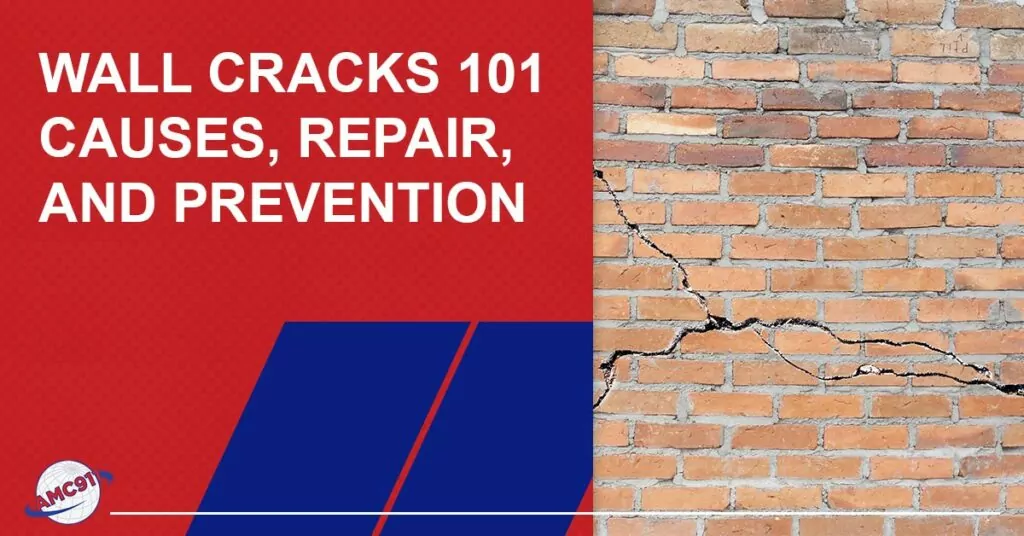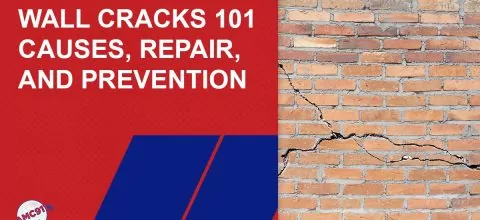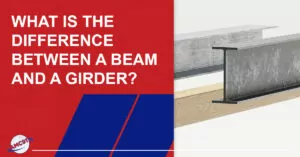Looking for information about wall cracks and wondering if they’re serious? Yes, wall cracks can indicate your home has a foundation problem. However, not necessarily. Sometimes, a wall crack is just ugly and caused by something like paint buildup or improperly taped drywall. This article will give you insight into which is which. We’ll look at the causes of wall cracks, learn about repair options, and discover ways to help prevent wall cracks.
What Causes Wall Cracks?
Wall cracks can be caused by a variety of factors, including the following:
- New construction – This can occur when green lumber used in construction gradually shrinks as it dries out. This type of cracking is usually minor and can be addressed with simple repairs.
- Differential settlement – A more serious cause of wall cracks is differential settlement. This occurs when a building’s foundation settles unevenly into the ground, which can cause – among other things – cracks in the walls. Foundation problems such as differential settlement need to be addressed immediately by a professional foundation repair contractor to prevent further damage.
- Problems with the wooden structures in a crawl space – If wooden joists, beams, or support posts start to deteriorate, this can cause wall cracks and other problems.
- Hydrostatic pressure – Poor drainage can cause hydrostatic pressure to build up in the ground around a foundation and push against the foundation walls, causing them to bow inward and even crack. This problem requires extensive repairs and waterproofing to prevent further damage.
- A house that sits vacant for most of the year – In some cases, wall cracks can be caused simply by a home sitting empty for most of the year. Fluctuations in temperature and humidity can cause walls to expand and contract, leading to cracking over time.
- Improperly taped drywall or paint buildup – If the drywall tape and mud aren’t applied correctly, the tape can come loose, creating a crack. Similarly, if paint is applied too heavily or frequently, it can build up and crack.
- Plumbing leaks – Leaks can also be a cause of wall cracks. If a pipe or other fixture leaks behind a wall, it can lead to discoloration and cracking over time.
There are many potential causes of wall cracks, ranging from minor issues to serious foundation problems. To ensure the safety and stability of your home, have any cracks inspected by a professional and addressed quickly.
How Are Wall Cracks Repaired?
As noted above, wall cracks can appear for various reasons, such as differential settlement, poor drainage, plumbing leaks, or poorly executed drywall installation. Therefore, the chosen repair method will depend on what caused the wall crack. Here are some possible repair solutions:
Wall cracks caused by differential settlement
If the wall cracks are due to differential settlement, underpinning is the most common repair technique. This process involves excavating the soil below the foundation and installing additional structural support, such as push, helical, or slab piers, to transfer the load to stable soil and prevent further settling. Once the piers are in place, the foundation is gently raised, and this often closes the cracks, which can then be patched and re-painted.
Wall cracks caused by hydrostatic pressure
For wall cracks caused by hydrostatic pressure, carbon fiber straps or wall plate anchors are two common repair solutions. Carbon fiber straps are strips of woven carbon fiber – an extremely strong material used to build commercial aircraft – bonded to the wall using epoxy. These straps prevent foundation walls from further movement. Wall plate anchors are designed to do the same thing. They strengthen and stabilize the wall, preventing further movement.
Wall cracks caused by improperly taped drywall
These cracks can be fixed by simply retaping the drywall.
Should I Worry About a Wall Crack?
As noted above, while some wall cracks may be a simple cosmetic issue, others may indicate a foundation problem. The latter are the cracks to worry about. However, which are which? Here are some things to look out for:
Signs a crack is likely caused by a foundation problem
- The crack is wider than ⅛ inch
- Horizontal cracks
- Diagonal cracks
- Stair step cracks in brick or masonry
- A series of vertical cracks next to each other
Usually, the bigger the crack, the more likely it is to have been caused by a foundation problem. Use common sense. Sometimes, you’ll just know the crack is caused by something serious because it looks bad.
If you see a crack that looks bad, look around for other signs of a foundation issue. These include:
- Uneven floors
- Doors or windows that stick or won’t open and close properly
- Gaps between the walls and ceiling or floors.
- A chimney or porch that’s pulling away from the house
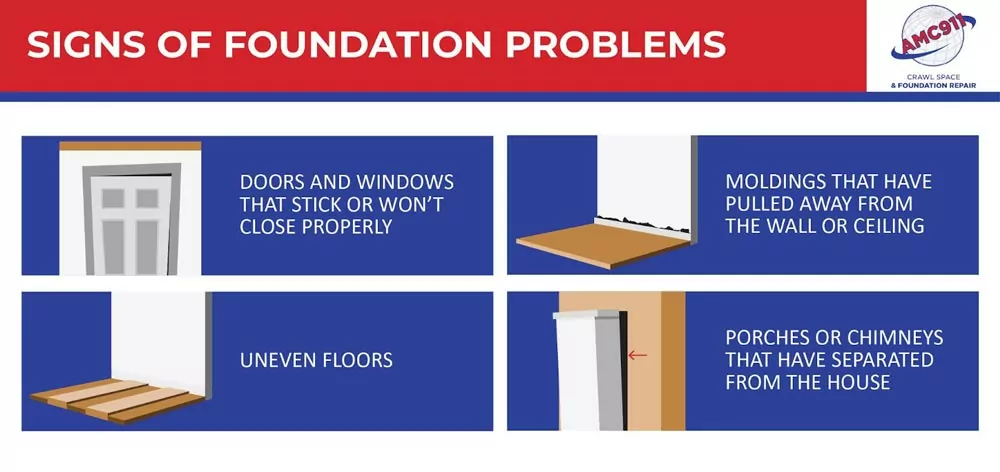
If you notice any of these issues, contact a foundation repair contractor right away and ask for an evaluation.
How To Help Prevent Wall Cracks
Fortunately, there are measures homeowners can take to help prevent foundation issues and maintain their home’s structural stability. Since most foundation issues are caused by water, most of these measures involve controlling groundwater:
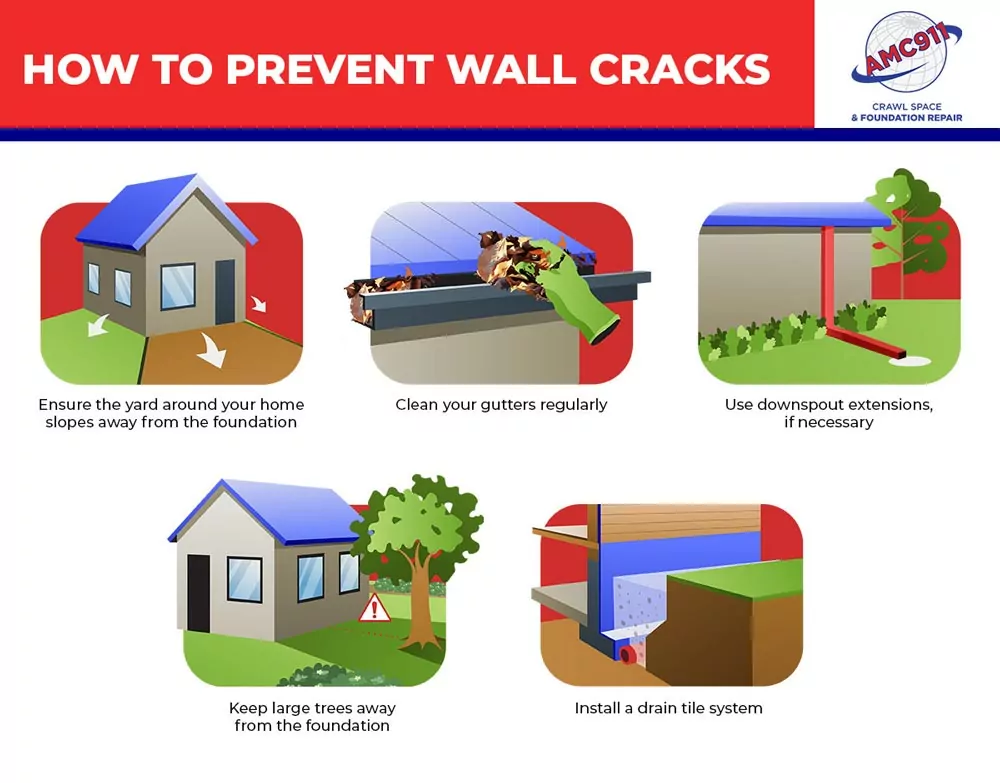
- Regrade your yard – Regrading involves changing the slope of the yard to ensure that groundwater drains away from the foundation rather than towards it. This will help to prevent water from collecting near the foundation.
- Clean gutters regularly – Ensure your gutters are free from debris and leaves so that water doesn’t overflow, run down the side of the house, and soak the ground around the foundation.
- Install downspout extensions – Downspout extensions will direct runoff away from the foundation before release.
- Keep trees away from the foundation – Some trees have extensive root systems that can invade the ground under the foundation and cause a lot of trouble.
- Install a drain tile system – Drain tile systems help prevent water-saturated soil around the foundation.
What To Do If You Have A Wall Crack
The first step is to identify the root cause of the crack. It might have been caused by something as harmless as improperly taped drywall. However, there’s a chance it might have been caused by a serious foundation problem. If you’re unsure, contact an experienced foundation repair contractor and ask for an evaluation. Keep in mind that foundation problems spotted early cost less to repair.
If you’re concerned about a wall crack in your Hampton Roads home, contact AMC911 today to schedule a free evaluation.

